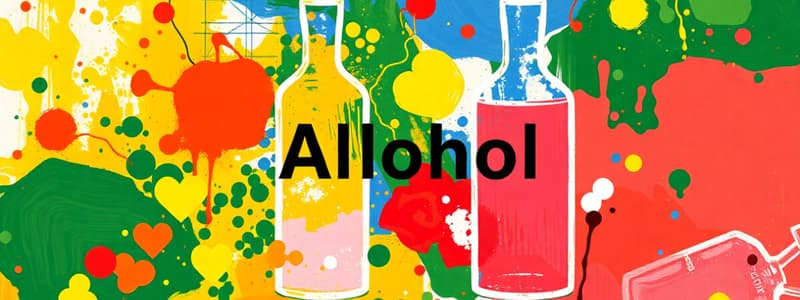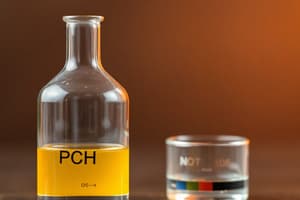Podcast
Questions and Answers
Which type of alcohol is characterized by the hydroxyl group being connected to only one carbon atom?
Which type of alcohol is characterized by the hydroxyl group being connected to only one carbon atom?
- Primary alcohol (correct)
- Quaternary alcohol
- Tertiary alcohol
- Secondary alcohol
What is the main chemical property that differentiates phenols from alcohols?
What is the main chemical property that differentiates phenols from alcohols?
- The acidity of phenols is higher than alcohols (correct)
- Their solubility in water
- The presence of an aromatic ring
- Their molecular weight
What is the result of adding aqueous sodium hydroxide to phenol?
What is the result of adding aqueous sodium hydroxide to phenol?
- Deprotonation of the -OH group occurs (correct)
- The phenol will turn blue
- No reaction will happen
- The phenol will precipitate
Which statement accurately describes the solubility of alcohols?
Which statement accurately describes the solubility of alcohols?
In a Ritter Test, what happens to a primary alcohol upon oxidation?
In a Ritter Test, what happens to a primary alcohol upon oxidation?
What is the primary purpose of potassium permanganate (KMnO4) in the Ritter Test?
What is the primary purpose of potassium permanganate (KMnO4) in the Ritter Test?
Why do tertiary alcohols not react in the Ritter Test?
Why do tertiary alcohols not react in the Ritter Test?
What effect do non-polar alkyl groups have on the solubility of phenols?
What effect do non-polar alkyl groups have on the solubility of phenols?
Which of the following is true regarding the hydroxyl group in alcohols?
Which of the following is true regarding the hydroxyl group in alcohols?
Flashcards
Hydroxyl group
Hydroxyl group
A functional group containing a hydroxyl group (-OH) bonded to a carbon atom.
Alcohol
Alcohol
An organic compound characterized by the presence of a hydroxyl group attached to a saturated carbon atom.
Primary alcohol
Primary alcohol
A primary alcohol has only one carbon atom attached to the carbon carrying the hydroxyl group.
Secondary alcohol
Secondary alcohol
Signup and view all the flashcards
Tertiary alcohol
Tertiary alcohol
Signup and view all the flashcards
Phenol
Phenol
Signup and view all the flashcards
Acidity of phenols
Acidity of phenols
Signup and view all the flashcards
Water solubility
Water solubility
Signup and view all the flashcards
Ritter Test
Ritter Test
Signup and view all the flashcards
Carbon bearing the hydroxyl group
Carbon bearing the hydroxyl group
Signup and view all the flashcards
Study Notes
Alcohols and Phenols
- Alcohols are important compounds containing a hydroxyl group (-OH) bonded to a carbon atom.
- Alcohols are classified as primary, secondary, or tertiary based on the number of carbon atoms bonded to the carbon atom bearing the hydroxyl group.
- Primary alcohols have the -OH group attached to a carbon atom bonded to only one other carbon atom.
- Secondary alcohols have the -OH group attached to a carbon atom bonded to two other carbon atoms.
- Tertiary alcohols have the -OH group attached to a carbon atom bonded to three other carbon atoms.
- Phenols have the hydroxyl group directly bonded to an aromatic ring.
- Phenols differ from alcohols in acidity; phenols are significantly more acidic than alcohols.
- Sufficient aqueous sodium hydroxide will deprotonate the -OH group in phenols, but not in alcohols.
Properties of Alcohols
- The solubility of alcohols in water depends on their size.
- Smaller alcohols are generally soluble due to hydrogen bonding with water molecules.
- Larger alcohols are less soluble as the non-polar alkyl chains disrupt hydrogen bonding in water.
- Phenols also exhibit varying water solubility, decreasing with increasing nonpolar groups attached to the ring.
Ritter Test
- Used to distinguish primary and secondary alcohols from tertiary
- Potassium permanganate (KMnO4) is used as the oxidizing agent.
- Primary alcohols are oxidized to aldehydes and then to carboxylic acids.
- Secondary alcohols are oxidized to ketones.
- Tertiary alcohols do not react or get oxidized as there are no hydrogen atoms to be lost.
- KMnO4 changes color from purple to brown as it is reduced.
- Primary and secondary alcohols change the colour to brown because they are oxidized.
Studying That Suits You
Use AI to generate personalized quizzes and flashcards to suit your learning preferences.




